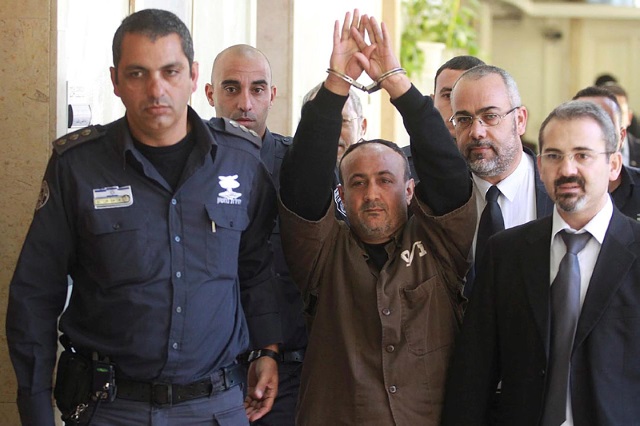By electing Marwan Bargouti to be party leader, Fatah conveyed a clear message – Abbas’ cabal and the old generation will continue to lead.
Palestinian Authority (PA) head Mahmoud Abbas, who was reappointed as the chairman of Fatah, tightened his hold on Fatah and shut out key rival Mohammad Dahlan, according to unofficial results Sunday of leadership elections in the movement, which has dominated Palestinian politics for decades.
The election comes as senior Fatah members are battling behind the scenes to succeed Abbas once the 81-year-old decides to step down. Abbas has given no sign that he plans to retire from the presidency or his top jobs in Fatah and the Palestine Liberation Organization (PLO).
On Saturday, more than 1,300 Fatah delegates confirmed Abbas’ continued Fatah leadership role by acclamation and elected 18 members of the movement’s top decision-making Central Committee.
Top vote-getters were Marwan Barghouti, a Palestinian terrorist leader jailed by Israel for multiple attacks and murders, and Jibril Rajoub, a terrorist and security chief who now battles Israel at international sports forums. Both are seen as potential Abbas successors, and their strong showing could improve their eventual succession bids.
Barghouti is serving multiple life terms after being convicted in deadly terror attacks and has no imminent prospects of release, but remains by far the most popular Fatah leader, which is indicative of the Palestinians’ mindset and aspirations.
Party officials have mentioned the possibility of Barghouti joining forces from behind bars with another Fatah leader in filling the role of PA head.
No Vision for the Future
While Abbas cemented his control over the movement, the re-election of party stalwarts and Abbas loyalists is bound to affirm Fatah’s public image as a stale, aging movement that has failed to deliver on Palestinian dreams of statehood and is out of touch with the concerns of ordinary Palestinians.
The Palestinian leadership is considered by the Palestinian street as oppressive and corrupt, while Abbas is thought to be a dictator.
Diana Buttu, a former legal adviser in Abbas’ self-ruled government, noted a lack of diversity in the Fatah leadership body, with only one woman among the 18 members and most of the remaining men in their 50s, 60s, and 70s.
Fatah leaders “believe that they are entitled to these positions,” she said. The re-election of party veterans “is saying to me that they don’t have a vision for the future.”
The elections took place during a Fatah conference that was also meant to block the return of Mohammed Dahlan, a former Abbas aide who fell out with his boss several years ago and went into exile.
Several Arab countries, including the United Arab Emirates (UAE), have been pressing Abbas to allow Dahlan, a millionaire businessman, to reclaim a leadership position in the PA. In arranging the conference, Abbas effectively blocked Dahlan’s return to the top ranks of Fatah.
During the conference, the delegates approved Abbas’ long-standing political program of setting up a Palestinian state through diplomatic maneuvers at international forums.
In closing remarks, Abbbas sid the conference was successful and achieved its set goals.
“Congratulation to the Palestinian people,” Abbas said. “The success of Fatah, which ignited the revolution [against Israel] and the Intifada and leads the national project, is the success of all Palestine and its people.”
By: AP and World Israel News Staff


